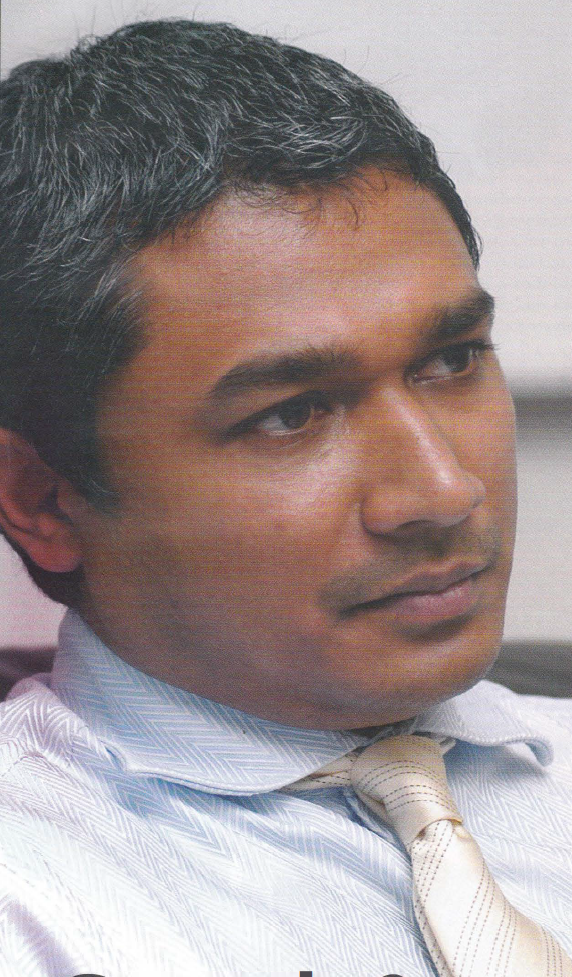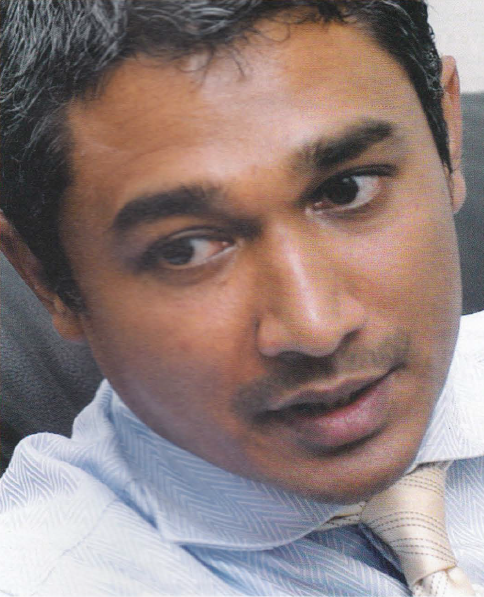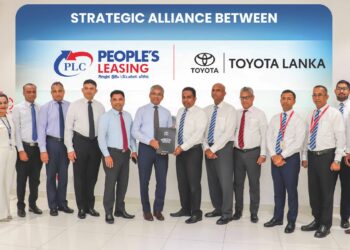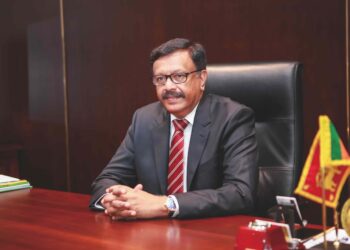By Karthiga R Ratnam

Chanaka Yatawara graduated in 1996 after obtaining a degree in Economics. After a stint of working in the USA in the finance industry he came back to Sri Lanka and joined Lanka Orix Leasing Company (LOLC). In 1999 he joined Shell Gas Sri Lanka where he worked for three years before joining the management team for three of Shell’s regional companies -Sri Lanka, Vietnam and Pakistan. In November 2004 he joined United Motors as Director of Operations where all operational divisions came under his purview. In an interview with Business Today he discusses the company, its strategies, and the automotive industry.
Once appointed as the CEO of United Motors Lanka Limited (UMLL), did you feel that you needed to change in order to better adapt to your new role?
Yes, because I had to move from a very operational type of role to a more strategic and people management role. As the CEO, I had to take a step back for a while to understand the bigger picture of the business and to identify the areas where we were not performing. I found that this process changed my role significantly. The challenge in a company like ours is that you are dependent on your labor due to the workshop operations that play a significant role in our after-sales business. This is a company with 300 members of staff and the way you relate to each other plays a critical role in the success of the operation. You need to be able to get down to the grass-root levels if you want to earn their trust and keep the levels of motivation high.
How do you improve the skills, abilities, and knowledge of your staff?
The company has been in the automobile industry for a long time. Therefore levels of competencies in their specific area are relatively high, considering that 70% of our staff have been with U. fLL for 9ver 20 years. The challenge however is to develop new competencies to align the business with our diversification strategies. We have now diversified our business to leasing, lubricants, TVS Motorcycles, hiring of vehicles, tires and agricultural equipment. I feel that it is key to identify these new business ventures beforehand to make sure that the right people will be running these businesses: and acquire the required compe·e ci through focused training and proper exposure in that area.
The style of leadership influences the level of motivation of staff. Do you agree and how would you describe your leadership style?
I fully agree. I believe that ooori leadership is absolutely e ential for the progress of any organizatio and the lack of can be detrimental. A mix of tough management where business strategies and discipline i concerned is necessary but being fair in the process is equally important. You need to have clear guidelines, but within those you should be flexible when needed. I have an open door policy, which takes a lot of my time as I find so many of our staff from every level walking in, but it has paid off as the level of trust and transparency has increased significantly. When you are not accessible as top management, the level of transparency is lost, it becomes suspect to people at the lower levels and then they tend to group in smaller numbers to be heard. But when you are accessible, it gives them a better sense of security and faith in the management. Trust has played an absolutely important role, especially with the unions. The improvement in relationships has been one of the most important aspects in the transition of UMLL and has helped to push the levels of motivation and productivity to new heights.
What is the best way to empower staff?
Rewards and recognition to me have a similar outcome. The staff at United Motors have performed very well in this financial year and the previous. We have introduced many performance based incentives and· rewards. This has also been critical because there has been a significant change in their levels of performance. One way to get out of the staff mindset of 9 to 5 jobs is appropriate rewards for reaching targets and objectives. I have learnt the value of these rewards by seeing sizable improvements in their performance. If you recognize people and reward them well you can be absolutely certain that they will perform to their highest potential.
What is the process of monitoring staff performance at UMLL?
We have introduced an annual appraisal scheme. I would like to start doing this more often, possibly every quarter. We have a ery structured approach to it. All employees are appraised by their immediate superior and then sent to an appraisal committee. The committee will re-evaluate the data for consistency; bonuses, incentives and increments will be based on this. This year we plan to give a copy of the appraisal form back to the staff member so that he/she can identify their own gaps During the next year they will strive to develop competencies in the areas that we have identified as gaps. This way we actually measure their performance and facilitate improvement in those weaker areas.
As a CEO, what are your priorities?
It is a public company and the major priorities are to give a healthy return to the shareholders year-onyear, to ensure high levels of corporate governance, and to develop our efforts in human resources.
In line with the vision of UMLL, is United Motors planning to diversify into other sectors or within the transport industry itself?
Our core business which is the agency for Mitsubishi is progressing well as we have a range of vehicles for most segments including the growing commercial vehicle segment. We have however, ventured into other areas in the transport and transport related sectors through our subsidiaries and joint ventures over the last few years. TVS Lanka has become a significant player in the two wheel category and has shown exponential growth over the last 2-3 years. Orient Financial Services is only two and a half years old but has become a recognized leasing company in a short time with a portfolio that is growing extremely quickly. Unimo Enterprises which is a fully owned subsidiary of United Motors has the agencies for the under 1000cc car Kelisa from Malaysia, Yokohama Tires from Japan, Farmtrac fourwheel tractors from India, Chinese two-wheel tractors and the latest addition of Chinese minivans, construction equipment and commercial vehicles. In addition, we also hold the agency for Valvoline Lubricants and Eagle One car care products from the USA. In this sense we have become a prominent and well recognized player in the transport and related industries. Whilst we consolidate these businesses we will continue to look at further opportunities within and also outside the industry for diversification.
How much progress has there been towards achieving the goal of becoming the best service organization in Sri Lanka. What sort of practices/standards do you follow in order to achieve this?
By being in several businesses related to our core business, I feel we have got into a position of offering our customers a wide spectrum of services for which they would have had to otherwise shop around many suppliers. Be it financing, servicing, repairing, lubrication, parts and accessories, car care products or a wide range of vehicles to choose from, we are able to give it all to them under one umbrella of companies. I think the strategy toward developing an organization that can offer many services in the industry has played a strong role toward the focus of the company and its current ability to offer them.
What are the Critical Success Factors for United Motors to ensure stakeholder satisfaction?
In order to satisfy stakeholders the bottom line plays a prominent role. When you have a good bottom line you can convince the shareholders to invest in the business and its people, which will result in higher levels of service to the customers, staff productivity and overall development.
Montero is a leading brand in Sri Lanka. With the entrance of new four-wheel drive vehicles into the Sri Lankan market, what sort of competitive strategy do you think UMLL needs to formulate?
The Montero has made a strong mark for itself because of its performance over the years, which has resulted in a high level of trust in the model. We will continue to market the Montero because of its acceptance and hope to introduce the new model as soon as it’s ready for export in 2007. Our strategy has however, been to offer several options in the fourwheel drive market without limiting ourselves to only the Montero range. We currently offer the Montero Sport and the Outlander as well, which are becoming very popular and vary in price in comparison. The new double cab four-wheel drive will also be launched shortly, for which we are expecting a lot of excitement in the market as it will have a completely new appearance and better features. The strategy for us will be to continue to look at models that can be marketed here across several customer segments that will offer good value for money.
So brand loyalty is the deciding factor?
When a customer invests a substantial amount of his money in any product, they want the assurance that the product is of high quality – hence the brand plays a major role in decision making. The Montero and the Mitsubishi brand have established itself globally and will certainly be a deciding factor.
What elements are taken into consideration when introducing a new model or brand of vehicle to Sri Lanka?
There is actually a stringent process that we follow which is also mandatory at Mitsubishi Motors Corporation level. When they look at a market they want to know if it is going to be profitable for them even at individual product level. Therefore, we go through a whole process of market research and feasibility. Sometimes we get an independent third party company to look at the market, see if the product offering has potential. We carry out internal studies, forecasting, and random questionnaires. All this is done before requesting for a new vehicle.
What was the thinking behind acquiring TVS Lanka?
We realized the potential of the two wheeler business and also the future prospects for it. The market has been growing at above 20% a year, especially for the Indian motorcycles which are becoming very popular in Sri Lanka. Due to the strength of the TVS brand in India we were confident that it would be the right product and partner for our market. Apart from the TVS two wheel business they are also an extremely diversified company; hence the potential to get in to other businesses with them is also great. For example, TVS is a company that manufactures spare parts for a lot of commercial vehicles, and has a strong market share in this business in India. We have now got into a venture with them to market these products in Sri Lanka through a company called TVS Auto parts. The company is about two years old and is growing. We feel that this company has vast potential that will be realized within the next two or three years, as the estimated market size for this industry is over a billion rupees.
Could you elaborate on the success story of TVS Lanka?
I believe that in our business the critical factor is the product, the range and the quality. TVS India is extremely supportive and they are a professional company. They have the right professional structure in place to facilitate the business here. We have also invested a lot of our time and resources in the right people. We have an excellent team at TVS with a total workforce of approximately 300 who get continuous training in their area of work.
We focus on sales, but moreover we look at spare parts and after-sales service. We have been focussing on extending our dealer network islandwide to make it easy for someone to buy a motorcylc in his area and not worry about spares or service.
The reputation of our brand ambassadors like Sachin Tendulkar for example has also helped gain the confidence of the consumer. To add to it we have used Sanath Jayasuriya and Muttiah Muralitharan, as local brand ambassadors. Due to the popularity of cricket, even in the north east, Murali’s recommendatin of the product has helped us command a strong share of the business in those areas. The other success factor is the fact that we offer a wide range of products. Many of the motorcycle companies that operate here have just motorcycles but we have a range. We offer the 100cc, 125cc, and 150cc – several in each capacity, mopeds, and also the scooter. The scooter is viewed as a safe, trendy product and also something a segment that would not usually ride a two wheeler – like the ladies – would consider buying. The scooter is growing in popularity among females, especially in the outstations.
How does Orient Financial Services fit into the overall strategy of UMLL?
It has a completely independent strategy. They work with United Motors but are not limited to leasing Mitsubishi vehicles alone. Being one of many leasing companies in the country, we have adapted a strategy of being innovative. Apart from some of the unique types of lease options we offer, we have also got into an agreement with Lanka Ashok Leyland to import their range of trucks on Leyland’s behalf and lease them through us.
Vehicle taxes in Sri Lanka are proving to be a heavy burden on the consumer. As a dealer what is UMLL doing? How is this affecting sales?
This is a serious issue that we are facing. The impact has been mainly on our passenger car segment and SUV segment. The duty is on slabs of the engine capacity, which has the worst impact on vehicles above 1500cc. The effect in this segment has been approximately 60% on the selling price since the increase.
We have lobbied individually and also through the Ceylon Motor Trading Association with little success. We are hopeful that the authorities will look at it and rationalize their deciion and see if they can reduce some of the levies in the near future. The impact of prices driven by levies results in encouragment of the reconditioned vehicle market, the impact of which results in higjer fuel consumption, which again results in a higher drain of our foreign exchange.
The increased taxes have increased prices. Therefore, how does United Motors provide a competitive price?
It is difficult. Looking at the absolute numbers sold of certain categories of vehicles like the Monteros for example, they have gone down drastically. The reason we have the ability to do well is because we are lucky to have a range of commercial vehicles for which there was a minimal duty increase. Taking the portfolio of vehicles that we have, you find that the trucks have done extremely well. This is how we balance it. This is one of the main reasons that we are now aggressively marketing the under 1000cc Kelisa from Malaysia, which has the least duty increase impact due to the lower engine capacity.
The increase in fuel prices is the biggest threat to the motor industry. Globally do you see a shift away from SUVs to hybrid vehicles?
I think that hybrid is still early in the process. But you will find even globally the trend is to move towards smaller vehicles. This is why we are so keen in promoting the Kelisa as we see the same trend in Sri Lanka. One reason for this is the rise in fuel cost and the other is convenience to get about in traffic. Cities around the world are getting congested now. Even in a country like the USA the younger generation and the ladies prefer to use smaller cars. Therefore, manufacturing of smaller cars has become the new strategy for most vehicle manufacturers. Looking at Sri Lanka you will find that the growth in the smaller car sector has been extremely high in the last 2-3 years.
The performance of United Motors in 2005 and what can be expected from UMLL in 2006?
The bottom line performance has been very encouraging. Mainly through good pricing and being as competitive as we can be. Through our people we have been ·able to maximize in terms of sales and after sales. The results of the 1st two quarters were 150% above the previous year’s performance and we are hoping to end the year on a similar note. On top of sales and service there is a lot of room to reduce non-value adding costs, we have a process in place where we minimize these cost by identifying them at divisional level. This too has had a strong impact on our bottom line. In addition our subsidiary companies too have done well – TVS Lanka and Orient Financial Services have significant improvements at the bottom line level and will contribute to the overall profitability of the company this financial year.
Are these the contingency plans that United Motors has in place?
The contingency plans are our subsidiaries. We see year-on-year growth in TVS for the next few years, strong prospects for Orient Financial Services, TVS Auto Parts and Unimo Enterprises. As I have mentioned Unimo has several agencies that have products that are competitively priced from China and India. The products from these countries in terms of quality and availability are improving annually and in the next few years may dominate our market.
In your view, what does the future hold for the Sri Lankan motor-sales industry?
I feel it will be challenging for European and Japanese manufactured vehicles if the duty structure is not reviewed. There will be an increased demand for the Chinese, Indian and Korean vehicles due to their lower prices. The motor cycle business will continue to grow at a high rate due to the fact that these products are now becoming more affordable as more easy payment facilities are made available by the banks and other financial institutions.
What is your vision for the company? Where do you want UML to be five years down the line?
My overall vision is for UMLL to be recognized as one of the best companies in Sri Lanka for its sustainability, diversification and return to its shareholders.
What sort of Corporate Social Responsibility initiatives has United Motors taken?
We strongly believe in our share of responsibility towards society. We have been doing several small projects annually. However, we are now looking at the possibility of focusing on one larger project so that the benefits will be more tangible and longer term. We also plan to get more of the company staff involved in these projects so that there is more sharing of responsibility. This will also help improve the mind set at all levels about the importance of projects of this nature.
What challenges do you face as a relatively young CEO in the private sector?
Undoubtedly it’s a challenge. But I also believe that perceptions change if you can be taken seriously. To be taken seriously you have to deliver, once you can be relied on for getting the job done people will see you differently.






